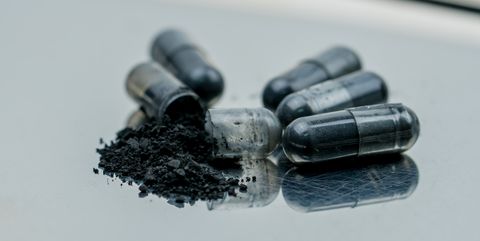
Leave it to one tiny, powder-filled capsule to polarize the health and wellness world.
Instagrammers have long been praising the detoxifying powers of activated charcoal. College students pop it to ostensibly get rid of hangover symptoms, and dieters swear that it can help you shed unwanted pounds. But does it actually work?
We hate to break it to you, but some experts say it may not be black magic after all. Keep reading to find out what we know about activated charcoal — and what we don’t.
What is activated charcoal?
According to the U.S. National Library of Medicine, activated charcoal is made from charcoal, which is typically made of peat, wood, or coconut shell. It’s “activated” by extreme heat — in fact, it’s the byproduct of slowly burnt organic matter. That process produces an extremely porous element that can adhere to many toxins it comes into contact with, which is why it has a reputation as a cure-all detoxifier (even though the claim that certain health and wellness products have “detoxifying” properties is largely, for lack of a better term, BS.)
Charcoal does have legitimate medicinal benefits. It’s been used in emergency rooms as a treatment for acute poisoning for more than 150 years, because it prevents toxic chemicals from being absorbed by your GI tract or bloodstream. That’s no small feat for a tiny pill, but is there any other science-based supporting evidence to back up the benefits of charcoal?
Can charcoal pills detoxify your body?
Health enthusiasts have incorporated charcoal pills into their daily detox regimens by putting them in juices, smoothies, or as a regular vitamin. Unfortunately, that’s not really a good idea.
“Because activated charcoal is not routinely used preventatively, there has been no real hard scientific research to support the detox claims,” registered dietitian Cynthia Sass, R.D., C.S.S.D. told Women’s Health. Unless you’ve consumed a toxic substance, the body has its own filtering and detoxifying system within the kidneys and liver (this is why the claim that certain health and wellness products can “detoxify” your body is, for lack of a better term, BS).
It’s also worth noting that charcoal is not regulated by the U.S. Food and Drug Administration. In fact, the New York state Department of Health has prohibited shops from selling trendy blackened ice creams because it’s “prohibited by the U.S. Food and Drug Administration (FDA) as a food additive or food coloring agent.”
Does activated charcoal work for hangovers?
Some people swear that activated charcoal pills can be effective at preventing hangover symptoms if you take them preemptively. Additionally, one (animal) study found that taking charcoal at the same time as alcohol can prevent your blood alcohol level from rising.
Unfortunately, you might have to start searching for another hangover cure. At least one study has shown that charcoal doesn’t bind well to the chemical structure of alcohol, making it ineffective in halting the inevitable morning-after migraine.
Can charcoal pills help relieve gas or bloating?
Charcoal pills are often advertised as a natural, over-the-counter gas or bloating reliever, and — surprise! — the research surrounding these benefits is just as murky.
According to the U.S. National Library of Medicine’s scale of effectiveness based on scientific evidence, there is insufficient evidence that charcoal pills can effectively alleviate GI issues. One study on the topic from The American Journal of Gastroenterology yielded conflicting results. In fact, activated charcoal can have the opposite effect: some pills contain sorbitol, which has been linked to nausea and diarrhea.
What are the risks of taking charcoal pills?
If you take a small amount of activated charcoal, it’s likely not going to do much to you. But consuming large amounts of activated charcoal could effectively block waste from passing through your body, potentially causing you to become constipated, Robert Weber, R.Ph., Pharm.D., M.S., administrator of pharmaceutical services at The Ohio State University Wexner Medical Center, previously told MensHealth.com
“That’s why we give patients potent laxatives when we give them activated charcoal in a poison control situation,” says Weber.
Worse, activated charcoal also has the potential to counteract the beneficial effects of prescription medication. “If you take [charcoal] about the time when you are taking your normal prescription medication … it would limit your ability to absorb [them],” Dr. Michael Lynch, medical director for Pittsburgh Poison Center and assistant professor in the department of emergency medicine at the University of Pittsburgh School of Medicine, told TODAY.
Bottom line: while a small amount of charcoal pills probably isn’t going to do anything to you, there’s no reason to take them regularly — in fact, in large quantities, they could even potentially be harmful to your health. So maybe keep charcoal in its rightful place: in your BBQ pit.
Source: Read Full Article
